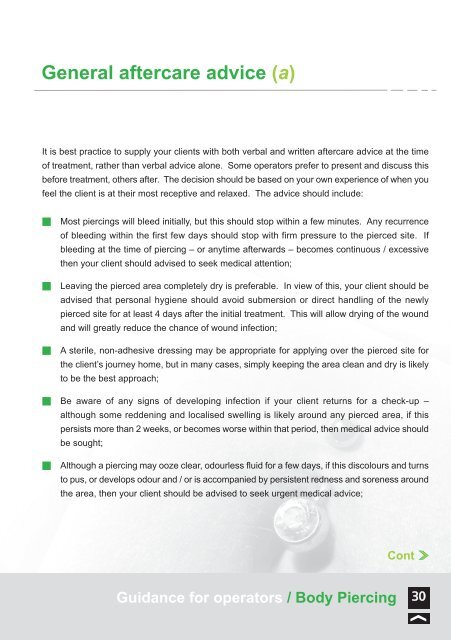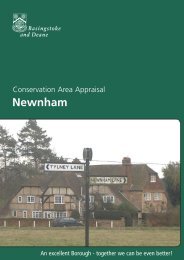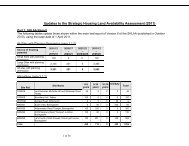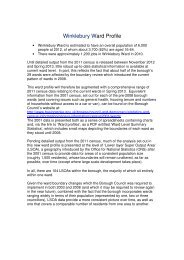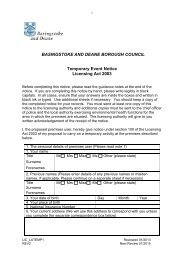Body Piercing Advice and Safe Practice - Charnwood Borough ...
Body Piercing Advice and Safe Practice - Charnwood Borough ...
Body Piercing Advice and Safe Practice - Charnwood Borough ...
Create successful ePaper yourself
Turn your PDF publications into a flip-book with our unique Google optimized e-Paper software.
General aftercare advice (a)<br />
It is best practice to supply your clients with both verbal <strong>and</strong> written aftercare advice at the time<br />
of treatment, rather than verbal advice alone. Some operators prefer to present <strong>and</strong> discuss this<br />
before treatment, others after. The decision should be based on your own experience of when you<br />
feel the client is at their most receptive <strong>and</strong> relaxed. The advice should include:<br />
■<br />
■<br />
■<br />
Most piercings will bleed initially, but this should stop within a few minutes. Any recurrence<br />
of bleeding within the first few days should stop with firm pressure to the pierced site. If<br />
bleeding at the time of piercing – or anytime afterwards – becomes continuous / excessive<br />
then your client should advised to seek medical attention;<br />
Leaving the pierced area completely dry is preferable. In view of this, your client should be<br />
advised that personal hygiene should avoid submersion or direct h<strong>and</strong>ling of the newly<br />
pierced site for at least 4 days after the initial treatment. This will allow drying of the wound<br />
<strong>and</strong> will greatly reduce the chance of wound infection;<br />
A sterile, non-adhesive dressing may be appropriate for applying over the pierced site for<br />
the client’s journey home, but in many cases, simply keeping the area clean <strong>and</strong> dry is likely<br />
to be the best approach;<br />
■ Be aware of any signs of developing infection if your client returns for a check-up –<br />
although some reddening <strong>and</strong> localised swelling is likely around any pierced area, if this<br />
persists more than 2 weeks, or becomes worse within that period, then medical advice should<br />
be sought;<br />
■<br />
Although a piercing may ooze clear, odourless fluid for a few days, if this discolours <strong>and</strong> turns<br />
to pus, or develops odour <strong>and</strong> / or is accompanied by persistent redness <strong>and</strong> soreness around<br />
the area, then your client should be advised to seek urgent medical advice;<br />
Cont<br />
Guidance for operators / <strong>Body</strong> <strong>Piercing</strong><br />
30


